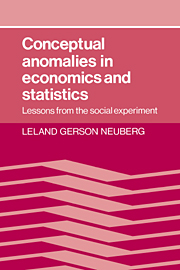Book contents
- Frontmatter
- Contents
- Preface
- Introduction
- PART I STATISTICAL LOGICS
- Chapter 1 J. S. Mill and some philosophical underpinnings of controlled experimentation
- Chapter 2 R. A. Fisher, randomization, and controlled experimentation
- Chapter 3 Some special difficulties of controlled social experiments
- Chapter 4 Hume's problem of induction in modern statistical inference and controlled experimentation
- Summary and conclusion of Part I
- PART II ECONOMIC LOGICS
- Conclusion: Some possible barriers to controlled social experiments as science
- Appendix: Proofs of theorems, lemmas, and propositions
- References
- Symbols and abbreviations
- Index
Chapter 4 - Hume's problem of induction in modern statistical inference and controlled experimentation
Published online by Cambridge University Press: 16 February 2010
- Frontmatter
- Contents
- Preface
- Introduction
- PART I STATISTICAL LOGICS
- Chapter 1 J. S. Mill and some philosophical underpinnings of controlled experimentation
- Chapter 2 R. A. Fisher, randomization, and controlled experimentation
- Chapter 3 Some special difficulties of controlled social experiments
- Chapter 4 Hume's problem of induction in modern statistical inference and controlled experimentation
- Summary and conclusion of Part I
- PART II ECONOMIC LOGICS
- Conclusion: Some possible barriers to controlled social experiments as science
- Appendix: Proofs of theorems, lemmas, and propositions
- References
- Symbols and abbreviations
- Index
Summary
Introduction: Hume's problem in the modern approach
In the first three chapters we have given considerable attention to the notion of causality. But Hume originally came to the notion of causality by posing another question. He first asks himself, “What is the nature of all our reasonings concerning matters of fact?” and answers, “they are founded on the relation of cause and effect.” He then asks, “What is the foundation of all our reasonings and conclusion concerning that relation [of cause and effect]?” and answers, “in one word, experience” (1955, p. 46). Thus, in arguing that our reasoning about matters of fact is based on “in one word, experience,” Hume appears to adopt an empiricist perspective.
But Hume's empiricism is not as thoroughgoing as that of his successor Mill. Hume continues his argument:
We have said that all arguments concerning existence [or matters of fact] are founded on the relation of cause and effect, that our knowledge of that relation is derived entirely from experience, and that all our experimental conclusions proceed upon the supposition that the future will be conformable to the past. To endeavor, therefore, the proof of this last supposition by … arguments regarding existence [or matters of fact], must be evidently going in a circle and taking that for granted which is the very point in question.
(1955, pp. 49–50; emphasis added)Hume then anticipates and rejects as circular Mill's later argument that Induction can be based on induction (see Section 1.2.2).
- Type
- Chapter
- Information
- Conceptual Anomalies in Economics and StatisticsLessons from the Social Experiment, pp. 89 - 113Publisher: Cambridge University PressPrint publication year: 1989

